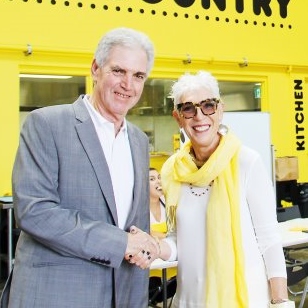click to dowload our latest edition
CLICK HERE TO SUBSCRIBE TO OUR NEWSLETTER


Published
5 years agoon
By
adminGILLIAN KLAWANSKY
Now living in Australia, it was a visit to South Africa that cemented the idea that would lead to Kahn creating one of the most successful food-rescue organisations in the world, OzHarvest, which recently delivered its one hundred millionth meal.
OzHarvest’s local equivalent, SA Harvest, a non-profit company, began operating in Johannesburg this week. It’s founder, Kahn, was recently appointed Officer of Order of Australia – the Australian equivalent of the Order of the British Empire – and is regarded as one of the world’s foremost social entrepreneurs.
Kahn has rolled out her food-rescue organisation in countries around the globe, but bringing it to South Africa is particularly meaningful to her. Speaking at an event hosted by the Union of Jewish Women in February, Kahn revealed how excited she was to be launching SA Harvest, 16 years after the birth of OzHarvest.
“The poignancy for me was that I was born and brought up in South Africa, but I left after matriculating, and was never able to give back to this country,” she said.
Kahn had the “lightbulb moment” that led to the founding of OzHarvest when she was driving through Soweto with a lifelong family friend, Selma Browde.
“I knew Selma had been an activist, but I didn’t know the details,” recalled Kahn. “As we drove into Soweto, Selma said to me in the quietest way, ‘You know, I was responsible for electricity in Soweto.’ As she said that, the hairs on my arms stood up and I thought, I want to know what it feels like to make that kind of impact on that many people. I knew that my life would never be the same again.”
While Kahn had already started delivering surplus food from her events company to an agency she knew, it was only on her return to Australia that OzHarvest officially came to be.
“I’d reached a point where I wanted to know what my purpose was, why I’d been created,” she said. “It couldn’t have been just to put food on my table.”
Fittingly, Alan Browde, Selma’s son, is SA Harvest’s chief executive. “Ronni and I grew up together,” says Browde, speaking to the SA Jewish Report. Having recently sold his marketing communications business, Brooke Browde Communications, Browde brings more than 37 years’ worth of experience in marketing and business leadership to the table.
While it’s a non-profit organisation, SA Harvest is a major undertaking. “We’re running a professional business, our operations systems have to be absolutely efficient, especially with regards to food safety,” says Browde.
“The harvest model is unique in that it can intervene in food waste,” he says. “Importantly, this enables us to work with perishable foods including in the use-by-date category. That’s where a massive amount of waste happens, and that’s where we’re going to make a big difference.”
As food nears its expiry date, supermarkets often start marking it down. At a certain point, they then get rid of this food, which is often thrown away. “Here we can intervene and save hundreds of millions of rands worth of food, delivering it to people in need,” says Browde. “Our model is to collect food from a variety of food donors, including supermarkets, in refrigerated trucks, deliver it on that same day, and ensure that it’s fed, via our beneficiary agencies, to the people in need immediately.”
SA Harvest complies strictly with the laws surrounding foodstuffs in the country, as mandated by the health department. “We have registered, certified vehicles that comply with the laws surrounding local municipalities – they’re checked, cleaned and hygienic,” says Browde. “We have a very fastidious programme where we make a note of the food that is collected, when it was collected, and when it is delivered to our beneficiaries.”
Education is one of the key pillars of the Harvest model. It starts with the driver. “Our drivers are vital to the successful distribution of food, and they’re trained to follow our processes strictly,” Browde says. “They know how to collect, record, and deliver everything, and they know the people they’re delivering to. We don’t deliver to end users, but rather to points of contact at beneficiary organisations including agencies, schools, old-aged homes, or feeding schemes, all of whom sign an agreement with SA Harvest saying they’ll stick to the plan. We help train them, ensure their refrigeration facilities are correct, and that they’ll prepare and serve the food that we deliver on that day.”
Events are also a major source of food for SA Harvest. “Whether it’s a Barmitzvah or wedding, up to 50% or 60% of the food ordered can go to waste.” There are also strict rules surrounding events and food safety. “If food has gone onto a plate, we don’t touch it,” says Browde. “We only collect and deliver foods that are still freshly cooked in their containers.” Food is collected immediately after the event, often at 01:00 or 02:00. “We collect and keep it refrigerated or frozen, and at 08:00 the next morning, it’s at our beneficiaries.”
Restaurant chains, corporate kitchens, and fruit and veg markets are also key food donors. “We also go to the source, the farms, where waste levels are massive.”
The Harvest model is completely based on donations, says Browde. There’s no monetary exchange.
SA Harvest started operations with a school in Alexandra township. It chose Alex because of its proximity to Sandton, raising consciousness about the economic gap between the two areas.
Raising consciousness and educating the public is key to SA Harvest’s mandate. “The food-rescue side is one part of the business – dealing with the crisis,” says Browde. “SA Harvest’s main purpose, though, is to be a thought leader in elevating sustainability and waste consciousness in South Africa.”
